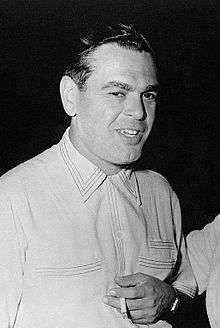Pandro S. Berman
| Pandro S. Berman | |
|---|---|
 Berman in 1953 | |
| Born |
Pandro Samuel Berman March 28, 1905 Pittsburgh, Pennsylvania, U.S. |
| Died |
July 13, 1996 (aged 91) Beverly Hills, California, U.S. |
| Resting place |
Hillside Memorial Park Culver City, California |
| Years active | 1923–1970 |
| Spouse(s) |
Viola V. Newman (?–?) Kathryn Hereford (m. 1960–1993) |
Pandro Samuel Berman (March 28, 1905 – July 13, 1996) also known as Pan Berman, was an American film producer.
Early life
Pandro Berman was born to a Jewish family[1][2][3] in Pittsburgh in 1905. His father Henry Berman was general manager of Universal Pictures during Hollywood's formative years.
Career
Pandro was an assistant director during the 1920s under Mal St. Clair and Ralph Ince. In 1930, Berman was hired as a film editor at RKO Radio Pictures, then became an assistant producer. When RKO supervising producer William LeBaron walked out during production of the ill-fated The Gay Diplomat (1931), Berman took over LeBaron's responsibilities, remaining in the post until 1939.
After David O. Selznick became chief of production at RKO in October 1931, Berman managed to survive Selznick's general firing of most of the staff. Selznick named Berman producer for the adaptation of Fannie Hurst's short story Night Bell, a tale of a Jewish doctor's rise out of the Lower East Side ghetto to the height of becoming a Park Avenue physician, which Selznick personally retitled Symphony of Six Million. He ordered Berman to have references to ethnic life in the Jewish ghetto restored.[4][5] The movie was a box-office and critical success. Both Selznick and Berman were proud of the picture, with Berman later saying it was the "first good movie" he had produced.[6]
The Fred Astaire/Ginger Rogers musicals were in production during the Berman regime, Katharine Hepburn rose to prominence, and such RKO classics as The Hunchback of Notre Dame and Gunga Din (both 1939) were completed.
MGM
Upset when an RKO power-play diminished his authority, Berman left for MGM in 1940, where he oversaw such productions as Ziegfeld Girl (1941), National Velvet (1944), The Bribe (1949), Father of the Bride (1950), Blackboard Jungle (1955) and BUtterfield 8 (1960).
He survived several executive shake-ups at MGM and remained there until 1963, then went into independent production, closing out his career with the unsuccessful Move (1970).
Awards
Berman was the winner of the 1976 Irving G. Thalberg Memorial Award. Six of his films were nominated for Academy Award for Best Picture: The Gay Divorcee (1934), Alice Adams and Top Hat (both 1935), Stage Door (1937), Father of the Bride (1950), and Ivanhoe (1952).
Death
Berman died of congestive heart failure on July 13, 1996 in his Beverly Hills home, aged 91. He was buried at the Hillside Memorial Park, Culver City, California.[7]
Selected filmography
- Stocks and Blondes (1928)
- Symphony of Six Million (1932)
- Morning Glory (1933)
- One Man's Journey (1933)
- The Little Minister (1934)
- The Gay Divorcee (1934)
- Wednesday's Child (1934)
- Of Human Bondage (1934)
- Alice Adams (1935)
- Top Hat (1935)
- Swing Time (1936)
- Mary of Scotland (1936)
- Shall We Dance? (1937; uncredited)
- Stage Door (1937)
- The Hunchback of Notre Dame (1939)
- Ziegfeld Girl (1941)
- Rio Rita (1942)
- Dragon Seed (1944)
- National Velvet (1944)
- Song of Russia (1944; uncredited)
- The Picture of Dorian Gray (1945)
- If Winter Comes (1947)
- The Three Musketeers (1948)
- The Bribe (1949)
- Madame Bovary (1949)
- Father of the Bride (1950)
- Ivanhoe (1952)
- The Prisoner of Zenda (1952)
- Knights of the Round Table (1953)
- The Long, Long Trailer (1954)
- Blackboard Jungle (1955)
- Bhowani Junction (1956)
- Tea and Sympathy (1956)
- Jailhouse Rock (1957)
- The Brothers Karamazov (1958)
- The Reluctant Debutante (1958)
- BUtterfield 8 (1960)
- Sweet Bird of Youth (1962)
- A Patch of Blue (1965)
References
- ↑ The Jewish Chronicle: "Revealed: the truth about the ‘Jewish’ Hollywood" by Michael Freedland September 5, 2015
- ↑ Allan, John B. (July 5, 2011). Elizabeth Taylor. Blackbird Books.
- ↑ Brook, Vincent (December 15, 2016). From Shtetl to Stardom: Jews and Hollywood: Chapter 1: Still an Empire of Their Own: How Jews Remain Atop a Reinvented Hollywood. Purdue University Press. p. 17. ISBN 9781557537638.
- ↑ "Symphony Of Six Million – 1932". The Irene Dunne Site. Retrieved September 21, 2013.
- ↑ Doherty, Thomas (Summer 2011). "Symphony of Six Million". Cineaste. XXXVII (1). Archived from the original on September 25, 2013. Retrieved September 21, 2013.
- ↑ Arnold, Jeremy. "Symphony of Six Million". Turner Classic Movies. Retrieved September 21, 2013.
- ↑ Pandro Samuel Berman at Find a Grave
External links
| Wikimedia Commons has media related to Pandro S. Berman. |